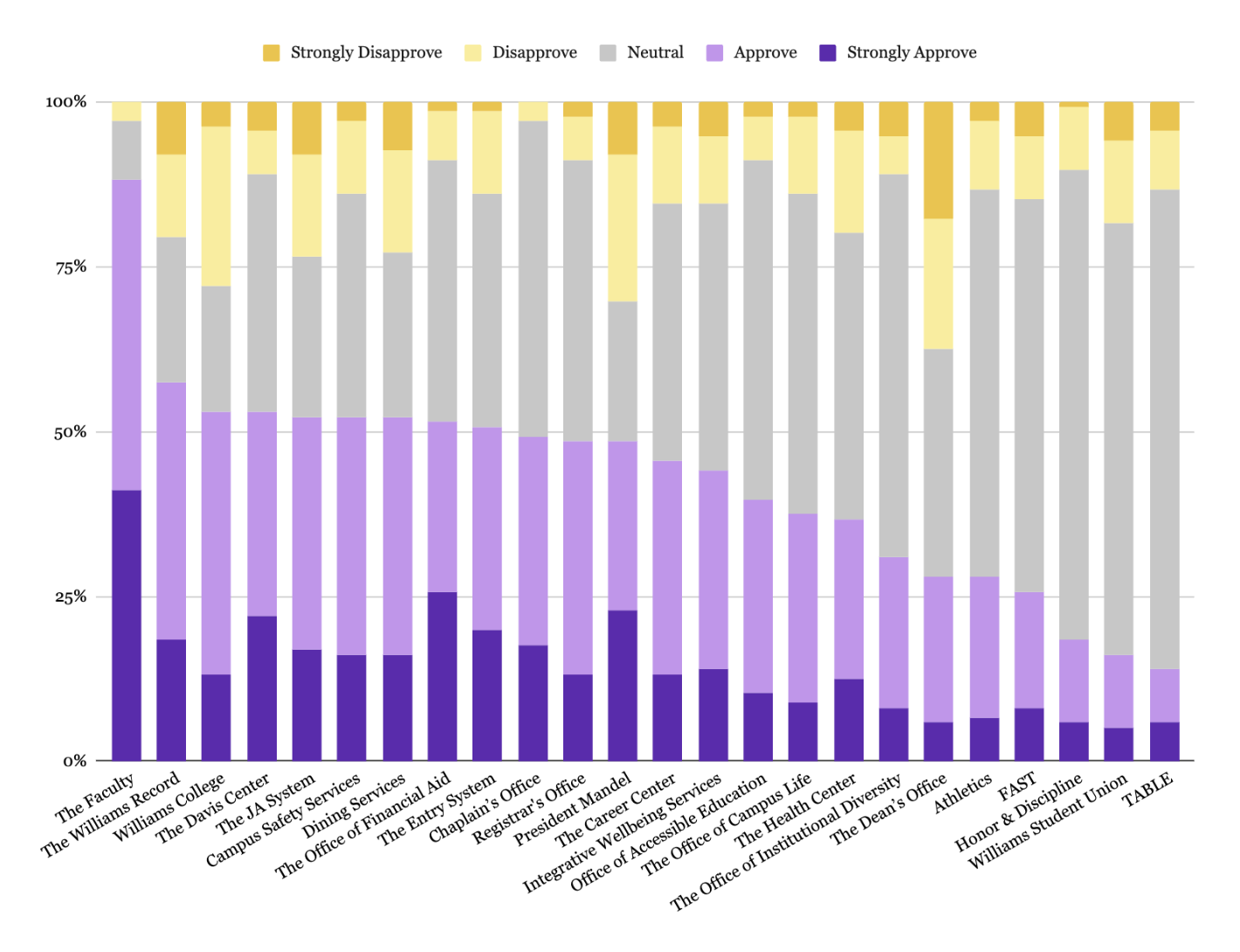
Last week, the Record sent its biannual approval ratings survey to 500 randomly selected students using a script in R. The survey asked students to indicate their approval, disapproval, or neutrality on many campus institutions, including the Junior Advisor (JA) system, the Davis Center, and President of the College Maud S. Mandel. It also asked students to indicate their favorability on current campus issues, such as legacy admissions, athletic recruitment, student activism, and Winter Study, which was a topic of debate at recent faculty meetings.
Out of the survey’s 136 respondents — a response rate of 27 percent — 17 percent were seniors, 23 percent were juniors, 30 percent were sophomores, and 30 percent were first-years. Off-cycle students were asked to round down their class years (for instance, students graduating in the Class of 2024.5 are considered part of the Class of 2024). The survey had an 8 percent margin of error at a 95 percent confidence level.
Students self-identifying as white made up around 60 percent of respondents, which is greater than the 48 percent of enrolled students who identify as white, according to the 2023-2024 common data set. Roughly 27 percent of respondents self-identified as Asian or Asian American, compared to the 14 percent of enrolled students, making them the second largest group in the survey. Nearly 53 percent of respondents said they receive financial aid, on par with the 52 percent of students at the College who do so. Fifty-two percent of respondents said they use she/her/hers pronouns, while around 40 percent of respondents said they used he/him/his pronouns. Six percent of respondents were international students.
As in the fall, the faculty is by far the institution with the highest overall approval rating, with 88 percent of respondents approving and only 3 percent expressing disapproval.
Following a major renovation and the unveiling of a new building, the Davis Center experienced the greatest increase in approval of any institution since the fall — by nearly a 13 percent margin. The approval of the Davis Center stands at 53 percent.
In the fall, the Record saw the largest decrease in approval ratings, falling 18 points from the prior semester to 46 percent approval. But in this spring’s survey, the Record garnered the second highest approval overall, with a rate of 57 percent. This marks an increase of 11 points.
On the other hand, following controversy over the JA program, the Dean’s Office had a 15-percent increase in disapproval, the highest among all institutions included in the survey. The Dean’s Office approval held steady at 28 percent, compared to 29 percent last fall.
Mandel’s approval rating stands at 49 percent, similar to the fall survey’s 44 percent. Mandel received relatively consistent approval ratings despite significant criticism amid calls on the College to divest from weapons manufacturing. Forty percent of students stated that they approved of the administration’s response to student activism, while nearly 34 percent disapproved.
The JA system saw a slight three-point increase in approval since the fall, receiving 52 percent approval. This increase occurred despite turmoil within the Junior Advisor Advisory Board (JAAB) and the program’s unclear future.
Integrative Wellbeing Services saw 44 percent approval, up by four points from the fall semester, and a reversal from last year’s trend of decreasing disapproval. Forty-four percent approval comes after calls for better access to mental health resources, particularly following the death of a student and JAs calling for increased support.
The institutions for which students expressed most neutrality were two out of the Three Pillars: TABLE, and Williams Student Union (WSU) received 73 percent and 65 percent neutrality, respectively. The Honor and Discipline Committee also received high neutrality at 71 percent.
The Record also surveyed students on their attitudes toward several topics relevant to campus life this semester. Seventy-seven percent of respondents reported approval towards Winter Study — slightly higher than last semester’s 70 percent — in the midst of continued faculty debate about the future of the program.
Peer institutions, like Wesleyan, have abolished their legacy admissions systems in the last year. Twenty-three percent of students surveyed approved of legacy admissions while nearly 49 percent disapproved. Another aspect of admissions practices, athletic recruitment, which peer institutions have been rethinking amidst a changing admissions landscape, received 35 percent approval, while 36 percent disapproved.
Nearly 18 percent of respondents said that the College offered sufficient support for students of color this semester, which was a slight increase from 13 percent of respondents in the fall. Approval of support for students on financial aid held relatively steady from last semester at nearly 43 percent.
Due to rounding, not all percentages will add to 100 percent.
Click here to access aggregated data from the survey.
The following items were also surveyed:
Williams College: 53% approve, 19% neutral, 28% disapprove
The Entry System: 51% approve, 35% neutral, 14% disapprove
Campus Safety Services: 52% approve, 34% neutral, 14% disapprove
The Registrar’s Office: 49% approve, 43% neutral, 9% disapprove
The Health Center: 37% approve, 43% neutral, 20% disapprove
The Career Center: 46% approve, 39% neutral, 15% disapprove
The Athletics Department: 28% approve, 59% neutral, 13% disapprove
The Office of Financial Aid: 51% approve, 40% neutral, 9% disapprove
The Office of Campus Life: 38% approve, 49% neutral, 14% disapprove
The Office of Accessible Education: 40% approve, 51% neutral, 9% disapprove
OIDEI: 49% approve, 21% neutral, 30% disapprove
Honor and Discipline Committee: 18% approve, 71% neutral, 10% disapprove
Chaplains’ Office: 49% approve, 48% neutral, 3% disapprove
Dining Services: 52% approve, 25% neutral, 23% disapprove








